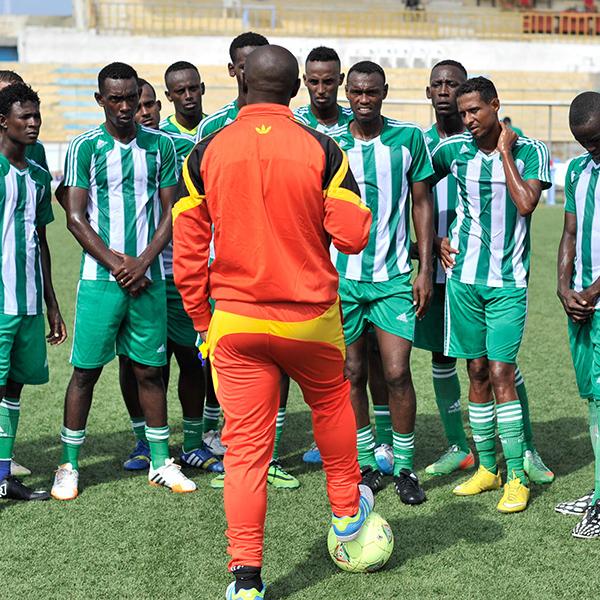
Maximizing Your Team Talks

“Alright, lads, it’s that time. We’re up against the top team in the league. So have some fun out there, no pressure, and also, I’d like to individually say that I have faith in each of you.”
Sound inspiring? It doesn’t to me. Yet that’s how many people introduce their team to a game, with the ritual of “let the Assistant Manager do it” and then the Three Invocations: Defense, I have faith; Midfield, I have faith; Attackers, I have faith. So say we all.
What’s Wrong With That?
So I’d like to introduce you to an exciting new idea from more than ten years ago: situational team talks. First, let’s look at the possible responses players can have to your team talks. In general, you’ll get one of a few positive responses:
- “Looked happy”
- “Looked delighted”
- “Seemed to gain confidence”
- “Looked to gain focus”
- “Seemed motivated”
- “Looked fired up”
I’m going from memory here, so the words may be slightly off on a couple. But those are generally the green results we’re looking for with our team talks. There are also negative responses:
- “Seemed confused”
- “Looked confused and demotivated”
- “Seemed pressured”
There are probably more negative responses, but without wanting to brag, I rarely get negative responses, so I’m not sure what the full range is. Suffice to say, we don’t want any of these responses. What controls these responses is largely hidden from view in the game. It’s the hidden attributes like “Pressure” and “Loyalty” that help to determine the response – along with their relationship with you and their teammates.
Looking at all the above, you’re probably thinking, “Wow, there are a lot of moving parts to what seems a simple enough thing.” I’d agree with you. You have to be aware of your players’ personalities, the squad personality, the situation with your league or cup, the rivalry status of the teams, and the relationship of the players to you (as represented by the Managerial Support bar on the Dynamics page). In that circumstance, with as many as a dozen team talk options on the table, many managers simply give up and let the Assistant Manager take over, before the I Have Faith ritual. I’d like to give you some recommendations on when a given team talk can be useful, and when it’s unlikely to be. I want to help you in maximizing your team talks.
Why Do Them Yourself?
First thing to look at is, why bother doing them yourself? Your Assistant Manager can do them effectively enough, and The Ritual usually results in lots of green, so why bother looking deeper? I contend that it is a key piece of the performance of your team, their mindset before and during the match. And as a key piece, it warrants your attention. Also, doing it yourself helps build the crucial relationships with your players. Letting the Assistant Manager do it builds the relationship with him instead. The more of them you do, especially in the early days with a new club, the quicker they’ll start responding positively.
What’s Wrong With The Ritual, Anyway?
It is my observation over time that while “I have faith” repeated three times in the prescribed way usually produces a fair bit of green response, those responses are usually underwhelming. The least useful is “looked happy”. You’re not here to make them look happy, you’re here to make them look determined and effective. So don’t be fooled by “looked happy”. It’s the weaksauce answer to a team talk. Same with “looked delighted” and “looked extremely delighted”. Those are post-game responses, you don’t want them in your pre-game talk.
The rest of the response with be “seemed motivated”, which is better. But if you watch carefully, you’ll see (and this is the worst part, for me) that as you do the three faith-givings, sometimes players you’re not talking to will change their already-given response after they see that you’re telling it to everyone. “Seemed motivated” will change to “looked happy”. I see it all the time in videos. This makes sense: “I have faith in you” is a powerful message when it’s to you or your unit, but when it’s just something the manager says to everyone, it loses its power some.
Also, and the game tells you this among the hints and tips it shows during saving, using the same one over and over diminishes the effectiveness of that team talk. You have to change things up, not be predictable, and start maximizing your team talks in the situation.
So What Should I Do Instead?
I’m so glad you asked. In part because of my overall philosophy of how to play the game, I believe you need to know your players as well as possible to maximize your team talks. There are several ways to do this, all important. First, know what their personalities are, and what they mean. There’s a great article here about what those personalities are, and how you can find out more about them. In short, look for evidence the game gives you: their reaction to talks and press items, their body language in games, their response to shouts, the coach report, the social group they’re in, and anything in their Plans section.
That’s the first part. The second part is to know your level of relationship with your players. You can find this on the Relationships tab on your Home page. The closer your relationship, the better. This will affect how much your team talks affect the player, and is why when you start with a club, you will likely get little response to your team talks. The text at the top will say that the players look to be in a good mood but distracted, or they aren’t really listening to you. This means they aren’t close enough to affect them emotionally.
Next, what’s the situation in the competition? Is it a knockout competition, with everything to play for? Second leg, down 3-1 from the first leg? Dead rubber of a league match at season’s end? You need to consider this when you’re choosing your team talk, because the players will consider it when they respond. The point is that the team talk should be situationally relevant. Don’t tell your players you expect a win when they’re 1-10 underdogs. Don’t tell them they’ll walk over it if they won’t. Keep your goals realistic and grounded in the situation, and you’ll have more success with maximizing your team talks.
How Do I Choose? There Are So Many!
Indeed there are. Some of them you can generally write off. I have never, ever, EVER had any success using “I have nothing to say”. And telling the team they’re going to win because they’re simply better should be a true thing you’re saying, or it will go wrong.
Some of them are useful in very specific situations. Most of you probably believe “Do it for the fans!” is useless, because they rarely respond. This is true, that they rarely respond. But if you use it when you’re playing a rival, it can be effective at motivating. The stronger the rivalry, the better the response. And it helps to be at home for that – there are a lot more fans there to do it for.
I’ve seen several people suggest that “Get out there and get revenge” leads to more aggression and cards, but this is not something I’ve observed. I do find it quite useful when you’re facing a team which has beaten you last time, but which you believe you should be able to beat this time. If that team is much bigger than you, though, this can lead to confusion and demotivation.
“Do it to show the media why they should back you” and “Do it to show the media they’re wrong about you” can both be powerful, and you’ll only get one of them depending on how the media are treating you just now. These are generally pretty reliable sources of green response, particularly “Seemed to gain confidence”.
Gaining confidence and focus are really valuable results from a team talk. Focus is the King of Results. The only time you have to beware confidence is when your team are flying high, on an unbeaten run, and are beginning to think too much of themselves. This leaves you ripe for a complacency crash, where you lose to the worst team in the league because your players thought they just had to turn up to win.
Managing that kind of complacency is a key element of team talks. You need to know what the confidence level in your team is like, so you can judge whether it’s helpful to increase it or give it a little knock, to remind them they’re human and can be beaten if they’re not careful. For this reason, I rarely use “Just play your natural game and you’ll win” or other confidence boosters when the team is already in good shape. This one I use when things have been going badly, or we’ve been unlucky a few games in a row, times like that.
Conclusion
The team talk is one of the most important tools in your box for man management. Along with press conferences – yes, you should be doing those yourself too – they’re the primary way you get to interact with your players on a regular basis. And interacting with players, building those relationships, is the path to getting the very best out of your players. You can absolutely win without doing so. But it’s a lot easier if you use the tools the game gives you to boost your success rate. Maximizing your team talks will help you do that.
Here are some other articles you may enjoy:
Follow us on social media: